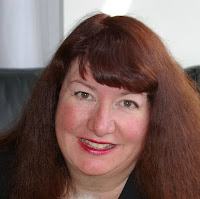I think it was Stephen King who talked about a little mail-order store in small town America...I've never been able to find that store myself. Stephen keeps it a close secret (I hope you're smiling.)
But I had reason to experience that dilemma about two years ago, a year into the pandemic, and two years after my beloved husband David died.
Damn that covid, and what it's done to publishing.
When Orca Books told me they were capping the line that carried my Goddaughter series (translation: still selling the books in the line, but closing it to future books, at least for now) I was in a tight spot.
I'd had 10 contracts in a row from Orca! That series garnered three major awards! How could I leave it behind?
I'd had 10 contracts in a row from Orca! That series garnered three major awards! How could I leave it behind?
Put another way: what the poop was I going to write next?
The Goddaughter series featured a present-day mob goddaughter who didn't want to be one. Gina Gallo had a fiance who thought she had gone straight. But of course, in each book she would get blackmailed into helping the family pull off heists or capers that would inevitably go wrong. It allowed for a lot of madcap comedy.
Some would say I was a natural to write a series about a mob goddaughter (we'll just leave it at that.) And I liked the serious theme behind the comedy: You're supposed to love and support your family. But what if your family is this one?
Issues of grey have always interested me. We want things to be black and white in life, but quite often, they are more complex than that. I like exploring justice outside the law in my novels. But I digress...
The Goddaughter books brought me to the attention of Don Graves, a well-known newspaper book reviewer up here. He commiserated with the end of the Goddaughter series, and immediately suggested the following:
The Goddaughter books brought me to the attention of Don Graves, a well-known newspaper book reviewer up here. He commiserated with the end of the Goddaughter series, and immediately suggested the following:
"Why don't you write about her grandmother? Prohibition days, when the mob was becoming big in Hamilton."
The idea burned in me. Except it wouldn't be her grandmother. (Don is older than me.) It would be her great-grandmother! Coming of age in the time of Rocco Perri and Bessie Starkman, the queen of mob women…
I settled on 1928, because that was the year women finally got the vote in England. The status of women features very much in this novel. Why? I was widowed too young. I could relate to my protagonist. That got me interested in how widows fared in ages past.
Did you know that the Magna Carta – which addressed the early laws of England established after the Norman invasion – was a turning point for women? In it, they decreed that a widow could not be forced to remarry. That meant a woman could hold the property of her late husband. Now, the fellows who came up with this law weren’t necessarily doing it for the benefit of women. Most experts agree that they were most likely keen on ensuring the late hubby’s property stayed in the family. But it had the effect of giving widows agency. Lucy, my protagonist, has money of her own, and that means freedom.
The time frame also allowed me to use the aftermath of WW1, including men like my own grandfather, wounded by gas, and shell-shocked. I would make the protagonist a young widow, because I knew grief - oh man, did I know grief. I could write convincingly about that.
But I would also use bathos to lighten the tale. (I seem incapable of writing anything straight.) The humour of the Goddaughter books finds its way into The Merry Widow Murders, and so far, has generated smiles for reviewers.
The book took me over a year to write, working full time on it. It helped me to channel my grief. It forced me to step out of my comfort zone and write something with considerable depth. I had to learn how to combine comedy and deep emotion, to the betterment of both.
And it taught me that - even widowed - I wasn't entirely alone. That ideas are beautiful things that can come from friendship, and the good hearts of readers and reviewers you are fortunate to meet along your publishing journey.
***
Called the "Queen of Comedy" by the Toronto Sun, and compared to Janet Evanovich by Library Journal, Melodie Campbell writes capers, heists and golden age mysteries. Winner of ten awards for crime fiction, Melodie has 17 books and over 60 short stories, but she got her start writing stand-up. The Merry Widow Murders has just been released from Cormorant Books.
“The high society flair of Death on the Nile meets a 1920s ocean liner in this sensational mystery from Melodie Campbell.” Open Book



2 comments:
Melodie, this will be wonderful to talk about in our conversation on Friday. I can empathize completely.
Lynne
Sounds wonderful! I’m about to order it from Amazon.
Post a Comment